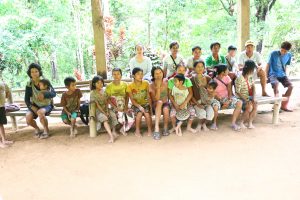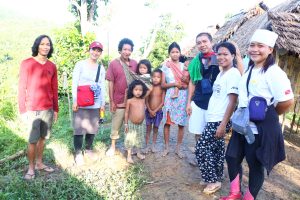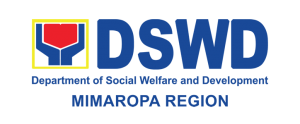
On May 21-25, 2018, Pantawid Pamilyang Pilipino Program visited the Indigenous Peoples (IPs) of Brgy. Ransang, Rizal, Palawan.
Before going to Sitio Signapan to meet with the Tau’t Bato tribe beneficiaries, the team stayed for a night in Sitio Ogis where they met Panlima Eldino Goling, one of the tribal leaders in the community. Panlima Eldino, a program beneficiary under RCCT, shared that he was originally from the Tau’t Bato tribe who decided to reside at the foothill of the mountain. According to him, it was hard for the tribe to access health care and education because of their distance hence he decided to build a permanent home in Sitio Ogis with his family.

Since malaria cases are rampant in their area, two of Panlima Eldino’s children became volunteer health workers who conduct Malaria Rapid Diagnostic Test (RDT) through the Kilusan Ligtas Malaria (KLM) program. Panlima Eldino also sought assistance to KLM to help him build health center and daycare center in his own land. Already on process, Panlima Eldino initiated the construction of the centers to cater to the IPs in Sitio Ogis and to their neighboring sitios. He also started building kubol-kubol or small houses where students or families can live once the centers were built.
From Sitio Ogis, it took the team a 5-hour trek to reach Sitio Signapan. From there, they met 17 members of the Tau’t Bato tribe, who took part in the focus group discussion (FGD) led by the IP focal, Ms. Karen Uson. Since the payout was scheduled a day after the visit of the team, only few beneficiaries attended as some of them already went down from the mountains to be early for tomorrow’s payout. In the discussion conducted, it was learned that most children-grantees in the sitio attend non-formal schools and daycare centers.
Due to the distance of elementary schools in their sitio, most children, whose age grade should be in the elementary level, are likely to attend daycare centers and non-formal education. According to the parents, it is hard for them to let their children study in the lowland since they cannot monitor what they are doing and they fear that something might happen to them. Adding to that is the fact that most of their children help them in farming or kaingin. They suggested to build an elementary school situated in their sitio to make it easier for the students to go to school. Jonathan Diklay, MCCT- Social Welfare Assistant, who is also a member of the tribe, shared that they already started lobbying to the authorities to build a school in their community but the documents submitted were declined to be signed by the barangay officials due to unknown reason. It was agreed upon during the visit that the construction of school in Sitio Signapan will continue its petition with the help of the Department of Environment and Natural Resources and Pantawid Pamilya.
Most people of the tribe believe that education is important so that their children can learn how to read, write, and count. They believe that through education no one can take advantage of them. However, they do not consider education as a way to escape poverty or their difficult situation because of their culture. Since they are used to farming and living in the mountains, they still fear that if their children reach a higher level of learning, they will change behaviors and will not go back to their tribe again. This also affects parents’ action towards sending their children to school outside their community. ###
![]()


